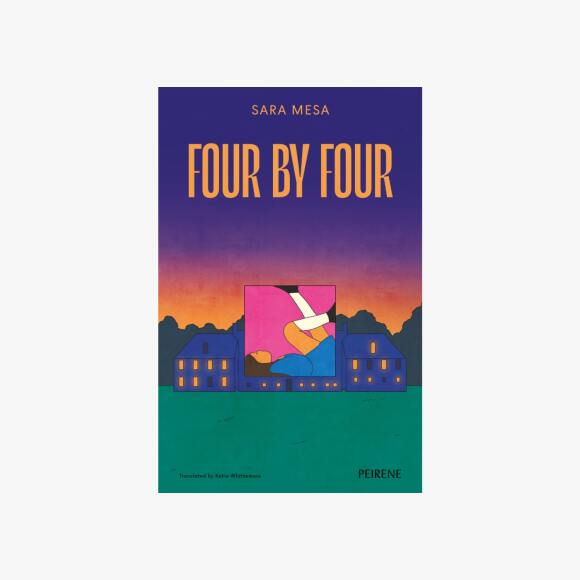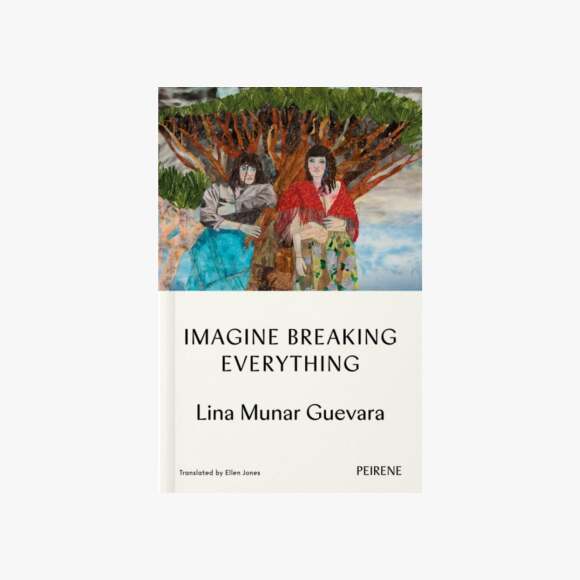Our latest book club pick is Four by Four by Sara Mesa, translated by Katie Whittemore. The novel comes to us from the brilliant indie publisher Peirene Press. Longtime subscribers may remember we featured Sara Mesa’s Un Amor with them before.

Tim caught up with Stella Sabin, co-director at Peirene, to find out more about the evolution of translated fiction, and the role of indie presses in today's publishing landscape.
Tell us a little about your press… what sets Peirene Press apart?
Peirene was founded in 2008 by the novelist and journalist Meike Ziervogel. Meike is German, and when she moved to the UK, she was shocked by how little contemporary foreign fiction was available in UK bookshops – and how, when it was, the fact that it was translated was hidden from sight, deemed to make the work somehow ‘unsellable.’ For a long time, Meike and Peirene were one of only a few indies specialising in translation. Now, of course, Peirene’s approach is de rigueur, even among bigger publishers, and translation is seen as a selling point.
These days, I think what sets Peirene apart is our readership – they are exceptionally dedicated and supportive, and we still have a large subscriber base, which is essential to us, both for that direct feedback and for our viability as a business. Also, probably our design: we rebranded Peirene when James Tookey and I took over ownership of the press in 2021, working with designer Orlando Lloyd to create a concept that was still collectable and classic but also allowed us to collaborate with illustrators and license interesting artwork. I think Orlando did a brilliant job, and our books stand out on the shelf.
Why did you choose to get into publishing?
I don’t think I ‘chose’ to get into publishing per se. My background is in radio and audio production, and I took a part-time job at Peirene straight out of university. Slowly, publishing – or more specifically – Peirene started to become less of my part-time job and more of my career, and I felt my allegiances shift. At the end of the day, I don’t think the roles are all that different. I still see myself as a producer of sorts – just in a different medium. It’s the same skill set: finding the story, editing, packaging it up, and finding an audience. But I do prefer the pace of publishing – you get two years to publish a book, compared to three months to make a radio programme. I’m a lot less stressed!
How do you see the role of indie presses in the wider publishing landscape?
We are smaller, more nimble operations. We can take risks on books without getting them through the tiers of acquisition meetings and marketing teams. This has its pros and cons, but it means we don’t need to justify our publishing decisions based on what is already doing well in the market – instead, we can focus on what should be doing well or will be doing well. You see it often: bigger publishers taking their lead from indies. Look at the rising popularity of translated contemporary fiction and the increased emphasis on the art of translation. On the other hand, we obviously have more limited marketing capacity, which is why you often see authors launched by an indie who then move on to a bigger publisher.
Which Peirene title are you most proud of, and why?
I can’t answer that! Obviously, I’m proud of all our books and writers.

That said, one of the first books we commissioned as the new owners of Peirene in 2021 was Victor Heringer’s The Love of Singular Men, and that book will always be special to me, because it set the tone for the kind of books we wanted to publish. It’s so full of life – funny and playful but with a darkness at its centre that really moved me. Victor Heringer died in 2018, at just 29 – the same age I was when we published it – and we took our responsibility to him and his work very seriously.
It was translated from Brazilian Portuguese by James Young, who won our emerging translators’ prize – now the Stevens Translation Prize. I always love working with the winners of that prize and helping bring their first literary translation into the world. The Love of Singular Men was awarded the Jabuti Prize for Best Brazilian Book published abroad, and was shortlisted for the TA First Translation Prize, so I think we did a good job.
Which book throughout history do you wish you’d published?
This is a really difficult question – there are so many books I love, but would I love to publish them? Honestly, being an editor can take the pleasure out of reading; it’s a different perspective, and I have to constantly remind myself how to read for pleasure.
There are many writers whose books I could pick – Marilynne Robinson, J. M. Coetzee, Hilary Mantel… but I would rather remain a besotted reader of them!
When you read the manuscript for Four by Four - what made it a book that you simply had to publish?
I first read the US edition of Four by Four, and I couldn’t look away. Sara takes the systems that surround us – everyday relationships, families, schools, workplaces, communities – and turns them upside down, revealing their sordid underbellies, and the intimate power imbalances that sustain them.
We’d like to bring all of Sara’s works to UK readers. We think she’s an unparalleled writer with her own very specific perspective on the world. Her writing is so precise and sparing, yet at the same time full of ambiguity – nothing is ever clear-cut in her books. We published her novel Un Amor last year and will publish Family next year.
For Sara, it’s been a strange experience revisiting a book first published in Spain in 2012. But she told me it remains one of her most important works, and it is in some ways closer to what she is writing about now – so she’s really enjoyed the experience of being back in its world.
What can readers expect from you in the next 12 months?
We have two more books slated for 2025: Imagine Breaking Everything by Colombian writer Lina Munar Guevara, a book following a teenage girl in Bogota, exploring the ways that violence perpetuates itself; and Sea Now by the Dutch writer and philosopher Eva Meijer, a climate novel set in the wake of the flooding of the Netherlands.

To start 2026, we have a book I’m really excited about – She Who Remains by Bulgarian writer Rene Karbash, set in the Accursed Mountains in Albania, following a sworn virgin who renounces her womanhood to escape an arranged marriage, with rippling consequences for her and those around her.
What was the last indie book you read?
Sadly, I’m elbow-deep in submissions at the moment, so I haven’t had much time to read new works. It was probably A Leopard-Skin Hat, published by Lolli Editions.